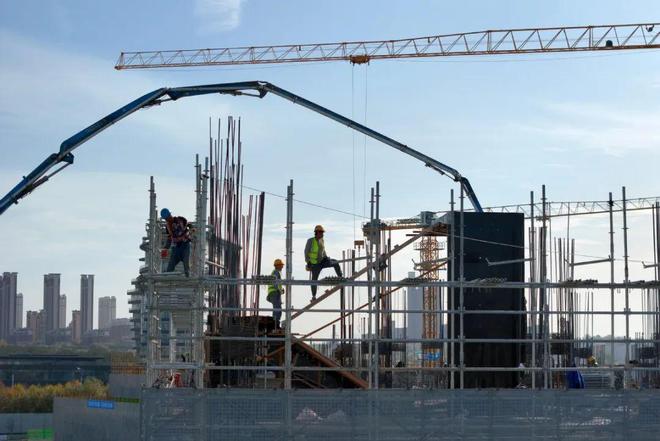保利“腰斩”现反击,几多隐忧?
2023-12-12
更新时间:2023-12-12 10:34:15作者:橙橘网

(此文观点已发表于英文版中国日报China Daily2023年12月11日)
中国房地产业界的状况,持续地成为社会各方关注热点,也内含经济社会“高质量发展”中的难点。2022年4季度之后,针对房地产领域最有影响力的开发商之一恒大所出现的资金链危机,以及人们担心房地产市场上发生“多米诺骨牌”式连锁反应而情绪惶乱的局面,中央决策层面对于房地产业界的市场运行,推出了一系列可称为“暖风频吹”的政策措施,基本取向是在明确认定房地产业是中国国民经济支柱产业的定性基础上,结合“六稳”、“六保”等经济工作要领,引导“企业自救”,同时以政府融资政策注重支持和保障房地产领域刚需与改善性需求的满足。管控中,逐步化解业已凸显的房地产市场运行风险,并在“问题导向”下及时推出“保交楼”、降低房贷首付比例与利率等指导方针与细化措施,稳住大盘。随国内新冠疫情得到总体控制的新局面,2023年进一步配合“扩大内需”支持经济增速回升,强调房地产调控的“一城一策”而具体化、定制化地推进各地房地产领域回暖过程。
到当下看,虽然还有房地产市场上个别、局部的违约案例等的困扰,但总体的态势是人心趋稳、运行趋稳,政策“组合拳”效应在合乎逻辑地显现。住房和城乡建设部的数据平台显示,今年1-10月全国一、二手住房交易量实现正增长,而住房竣工量增长了19.8%,是信心提升、预期改善的表现。下一阶段,住房有效供给的支撑力将继续上升,可望进一步满足社会需求。与此同时,中央明确给出了中国房地产市场供应关系已发生重大变化的基本判断;北上广深一线城市,以“认房不认贷”等新规则放松行政性购房控制;南京、青岛等省会城市和中心城市,已纷纷取消限购、限贷等行政控制手段。上述一、二线城市的“风向标”效应,将引导和影响更多三、四线城市的市场回暖。再加上管理当局正以城中村改造、保障房建设与相关房源转化供给机制的结构优化举措等的部署,将进一步优化住房供给结构和低中收入阶层“住有所居”保障条件。这些使我们可以有充分把握作出前瞻:我国房地产市场这一轮的风险管控将取得决定性的成功。当然,整个局面的向好也并不排除“波浪式”行进特征,而且必然将表现出不同城市、不同区域的差异化。特别是从短期的“稳住”,到中长期的打造房地产业界“健康发展新模式”,还必须依靠相关制度、机制改革创新方面的攻坚克难,以求真正摆脱前面十多年几轮房地产调控“只治标不治本”的低质循环,形成更好发挥国民经济支柱产业功能作用的长效机制。
这种房地产业健康发展新模式和长效机制的打造,客观上要求以“基础性制度建设”深化配套改革。所涉及的,至少有土地制度、住房双轨制、商业金融与政策金融配合呼应的制度体系,以及住房在其持有环节的税制建设这四大方面。我国前些年房地产市场的冷热交替很容易表现为“大起大落”不良波动,相关的重要原因之一,是地方政府层面在地方税体系迟迟未能构建成型、而各地领导层在“政绩锦标赛”式地方竞争中争先恐后、需要得到大笔财力支持的情况下,特别看重以辖区土地一级开发环节的“批租”(土地使用权竞争性交易机制)取得可以把资金尽可能“一次性拿足”的结果--以此种机制获取较充足的财力来贯彻区域发展战略,支持尽快出政绩,是使每一块地皮实行批租后,将有40-70年时间段不再有任何可能以此机制再取得这种财力,这将覆盖十几届、甚至几十届后面的政府行政期,然而,这并不能制约实施土地批租时点上,当地领导者(“关键的少数人”)“一次把钱拿足”的冲动——以后各届的财力如何取得,不是他的关切之所在。由此,很容易形成作为土地所有者的政府方和作为开发商的企业方的“合谋”情境:即政府方愿以招拍挂带出高价,企业方也顺应政府方意愿以高价拿到地段开发权,再以住房建成售出时的高价覆盖拿地成本——这便是为人们所诟病的“土地财政”短期行为的形成机制,相应地构成房地产市场上极易“地王”频出、价格冲高、局面大起而后又大落的风险因素积累。由此可知,地方政府“土地财政”依赖性的破解,关键在于相关制度机制的改革创新,特别是要借鉴市场经济的国际经验,使土地开发形成的住房这样的消费性不动产,在其持有环节的税收,于中国从无到有,形成地方政府每一年度都可获取的相当稳定而带有大宗规模化特征的财力来源,从而对冲土地批租环节的短期行为动机。并且,这样可形成房地产市场运行中有利于土地集约利用(会生成更多小户型需求)和遏制“炒房”行为(持房即有税负制约)的“压舱石”效应。这是既以经济手段的力量平抑市场可能的过大起落,又以稳定可预期的财源建设机制“内生地”促使地方政府职能合理转变,让他们更多注重优化本地公共服务、改善投资环境,因为房地产税的持续征收,需要政府公共品供给的更高水准,并有每隔一段时间可重评税基的机制,切实地激励地方政府不断改善公共服务从而服务于高质量可持续发展。此税还是促进共同富裕重要的再分配手段。
这方面制度机制建设的攻坚克难,在中国是一个需要克服阻力、循序渐进的改革系统工程。势在必行的房地产税制改革,虽在上海、重庆两地先行试点多年后,管理部门已有扩大试点范围的规划,但还需耐心等待可操作时机与基本可行性条件的具备。从全局和长远考虑,包括房地产税改革的配套改革大方向,毕竟是明确的和坚定不移的,以长效机制控制房地产市场风险和摆脱地方政府短期行为式土地财政依赖,以现代化财产税制支持于高质量发展中构建高质量的现代治理体系,将是中国建成现代化强国之路上所必须经受的历史性考验。
Real estate sector needs root-cause reforms
By Jia Kang | China Daily | Updated: 2023-12-11

A residential property construction site in Yantai, Shandong province. TANG KE/FOR CHINA DAILY
The real estate industry, a pillar of China's economy, has become a focus of attention because it is facing difficulties as the country transitions to innovation-driven high-quality development.
After the China Evergrande Group, one of the biggest names in China's property market, began facing severe financial problems, triggering fears of having a domino effect on the property market, the central authorities introduced an array of policy incentives to help property developers meet the sector's different demands.
But to address the apparent risks to the real estate market and accelerate economic recovery, the government should adopt more tailor-made policies including reducing the percentage of down payment for apartments, lowering the mortgage interest rate and adjusting the eligibility criteria for first-time homebuyers.
In fact, the favorable policies have helped stabilize, to a certain extent, the property market despite some cases of breach of contract. The national transaction volume of both new and secondhand residential properties achieved positive growth from January to September this year, while the completion volume of housing increased by 19.8 percent, which is indicative of improved confidence and expectations.
The central authorities have made it clear that the relationship between demand and supply in the real estate sector has undergone fundamental changes. New mortgage lending-related policies and measures to identify first-home buyers have been adopted in some first-tier cities with the aim of lifting administrative restrictions, while some other big cities have withdrawn property-purchasing and property-loaning limitations.
While these moves will stimulate the real estate market's recovery in more third- and fourth-tier cities, measures such as urban village renovation projects, construction of government-subsidized and affordable housing, and optimized supply-demand mechanisms would further improve the housing sector's structure and ensure low- and middle-income individuals have access to affordable housing. China's risk-control measures in the property sector are therefore likely to be successful.
The real estate sector's recovery, however, will be a wave-like and tortuous process, with different cities and regions facing different problems. Hence, it is necessary to reform more mechanisms by treating the root causes, not just the symptoms, of the socioeconomic diseases, so as to ensure the healthy development of the industry.
For example, it is essential to deepen reform to address the root cause, which includes the land-use rights and land revenue system, the dual housing program, the cooperative system between business finance and policy finance, and the property tax system.
One reason for the real estate sector to go through ups and downs was local governments' focus on the competitive trading mechanism for land-use rights against the backdrop of an imperfect regional tax system. It was very easy for the local governments, as the holders of the land, to "conspire" with real estate developers and sell plots at high prices to the developers. The developers in turn sold the houses at even higher prices to homebuyers to cover the cost of the land. This kind of "land finance" came into being.
The key to addressing the problems caused by the local governments' "land finance" is reforming the related mechanisms by, for instance, levying property tax, which will ensure local governments earn stable and relatively sufficient income annually. This can also boost intensive land use and curb the twists and turns of the real estate sector.
The property tax system could help stabilize the market and provide a steady source of revenue to local governments, which can use the income to optimize public services and improve the investment environment. To levy real estate tax, however, local governments have to provide higher-quality public goods and calculate, between intervals, the tax base, which means the local governments have to improve public services. Besides, levying real estate tax would also help redistribute resources, which in turn will promote common prosperity.
Although the collection of real estate tax has been piloted in Chongqing and Shanghai, the central government needs to gradually expand the pilot areas. It should also make efforts to establish long-term mechanisms to minimize risks to the property market and free local governments of their dependency on land revenue. In other words, the establishment of a modern property tax system would facilitate modern governance and high-quality development.
The author is chief economist of the China Academy of New Supply Side Economics.
贾 康 简 介
第十一届、十二届全国政协委员、第十三届全国政协参政议政人才库特聘专家,华夏新供给经济学研究院创始院长,中国财政科学研究院研究员、博导。曾长期担任财政部财政科学研究所所长。北京、上海、福建、安徽、甘肃、广西、西藏等地方政府特聘专家、顾问或咨询委员,北京大学、中国人民大学、国家行政学院、中央社会主义学院、南开大学、武汉大学、厦门大学、安徽大学等多所高校特聘教授。1988年曾入选亨氏基金项目,到美国匹兹堡大学做访问学者一年。1995年享受国务院政府特殊津贴。1997年被评为国家百千万人才工程高品质层次学术交流带头人。多次受党和国家领导同志之邀座谈经济工作。担任2010年1月8日中央政治局第十八次集体学习“财税体制改革”专题讲解人之一。孙冶方经济学奖、黄达—蒙代尔经济学奖和中国软科学大奖获得者。国家“十一五”、“十二五”、“十三五”规划专家委员会委员、国家发改委PPP专家库专家委员会成员。2013年,主编《新供给:经济学理论的中国创新》,发起成立“华夏新供给经济学研究院”和“新供给经济学50人论坛”(任首任院长、首任秘书长,第二届理事会期间任首席经济学家),2015年-2016年与苏京春合著出版《新供给经济学》、《供给侧改革:新供给简明读本》以及《中国的坎:如何跨越“中等收入陷阱”(获评中国图书评论学会和央视的“2016年度中国好书”)》,2016年出版的《供给侧改革十讲》被中组部、新闻出版广电总局和国家图书馆评为全国精品教材。2017-2020年又撰写出版《供给侧结构性改革理论模型与实践路径》、《供给侧改革主线上的未来财税》、《财政学通论》等多部专著。2021年与刘薇合作《双循环新发展格局》一书又获评“2021年度中国好书”。根据《中国社会科学评估》公布的2006~2015年我国哲学社会科学6268种学术期刊700余万篇文献的大统计分析,贾康先生的发文量(398篇),总被引频次(4231次)和总下载频次(204115次)均列第一位,综合指数3429,遥居第一,是经济学核心作者中的代表性学者。
贾康学术平台|版权属贾康先生,转载请注明“贾康学术平台”,感谢关注与支持!
做学问的甘苦,如鱼在水,冷暖自知,不足为外人道,但关于做学问的“指导思想”,我愿意在此一披襟怀:写出一些论文或著作并不是目的,这是探索之途上的一小步,是争取为人类的思想认识之海中加一滴水。我深信,一切人生的虚荣浮华都是过眼烟云,而真正的学术和真知灼见,才能垂诸久远。
—— 贾 康
也欢迎关注“新供给经济学论坛”